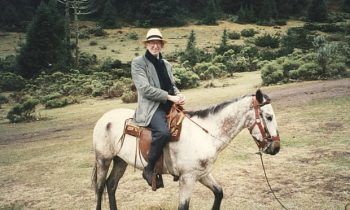Stefan Collini at The Guardian:
 He had not set out to become a professional historian; indeed, at one point he considered becoming a full-time organiser for the party. And although his early work fell in the academic sub-field of economic history, its inspiration was primarily political. For Hobsbawm, as for so many on the left in his generation, the question that needed addressing was the rise and dominance of capitalism: he later reflected that he chose economic history as his field largely because it was the only intellectual space in the academic world at the time where he could pursue his real interests in relations between “base” and “superstructure” in explaining social change. Emotionally, his sympathies were with capitalism’s victims and opponents. One of his early rejected books described industrialism as “almost certainly the most catastrophic historical change which has overwhelmed the common people of the world”, and he began to cultivate his interest in the forms of often unorganised or disguised resistance to it, especially forms of “social banditry” in the countryside.
He had not set out to become a professional historian; indeed, at one point he considered becoming a full-time organiser for the party. And although his early work fell in the academic sub-field of economic history, its inspiration was primarily political. For Hobsbawm, as for so many on the left in his generation, the question that needed addressing was the rise and dominance of capitalism: he later reflected that he chose economic history as his field largely because it was the only intellectual space in the academic world at the time where he could pursue his real interests in relations between “base” and “superstructure” in explaining social change. Emotionally, his sympathies were with capitalism’s victims and opponents. One of his early rejected books described industrialism as “almost certainly the most catastrophic historical change which has overwhelmed the common people of the world”, and he began to cultivate his interest in the forms of often unorganised or disguised resistance to it, especially forms of “social banditry” in the countryside.
more here.
